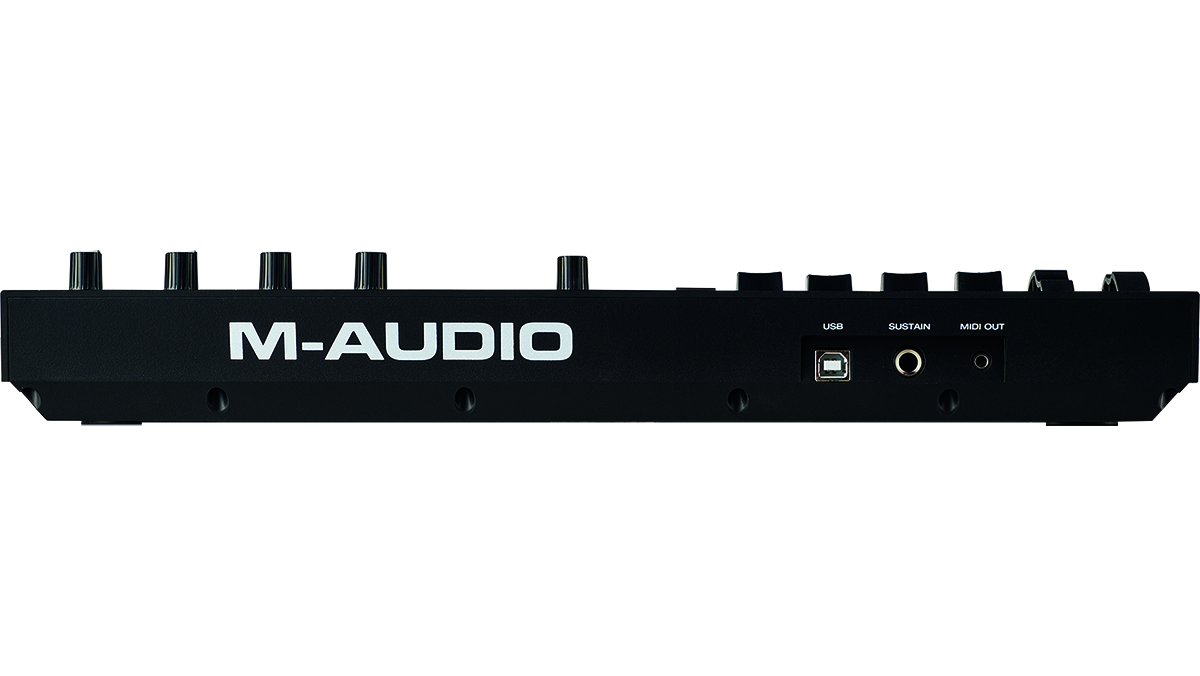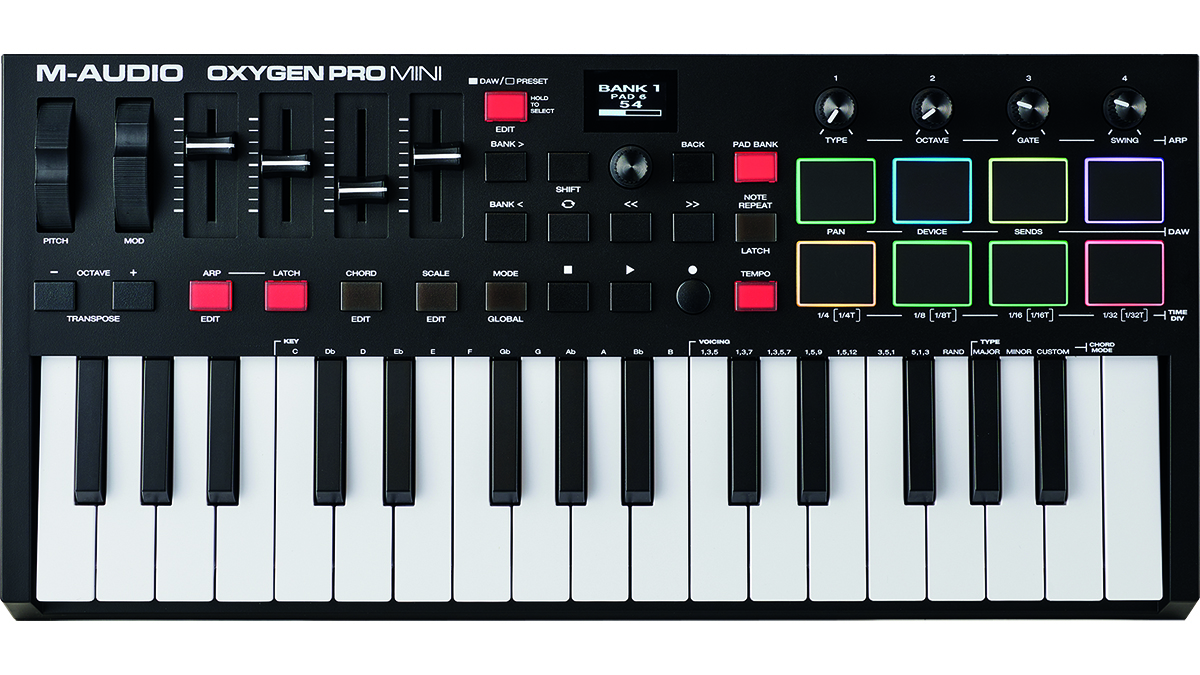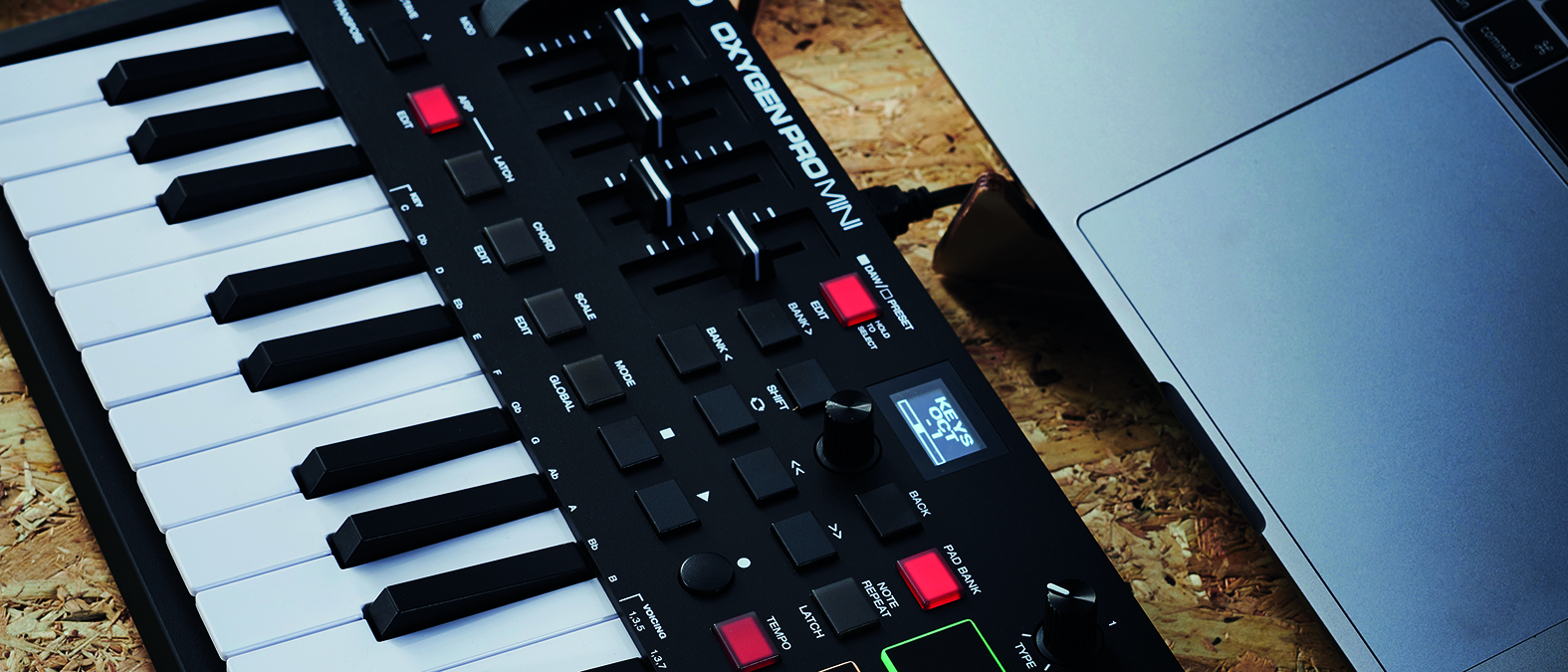MusicRadar Verdict
If you’re after an affordable compact mini-key controller with loads of features, then look no further.
Pros
- +
RGB backlit performance pads.
- +
Good range of onboard controls for DAW control and editing.
- +
Onboard or remote editing of controller assignments.
Cons
- -
No aftertouch.
- -
Buttons are a bit noisy.
MusicRadar's got your back
M-Audio Oxygen Pro Mini: What is it?
The Oxygen Pro Mini is the smallest of the four Oxygen Pro keyboards and the only one that features mini keys. At 40cm by 19cm and just over a kilo, Oxygen Pro Mini is also pretty portable.
Much like the Keystation Mini you’ve got 32 keys, which is a decent number for a compact design and handy for composition. And we have to say the PrecisionTouch semi-weighted action feels great. The only slight disappointment: no aftertouch.
The PrecisionTouch semi-weighted action feels great
In addition to USB and sustain pedal connections, there’s a MIDI output. This is on a mini-jack and to use this you’ll need a converter cable which, alas, is not included. However, once hooked up, you can set the MIDI out to be sourced from either the keyboard, DAW or both. So the Pro Mini also doubles as a MIDI output interface for your external MIDI gear.

M-Audio Oxygen Pro Mini: Performance and verdict
One of the great things about the Oxygen Pro range is the extensive performance controls and Pro Mini doesn’t disappoint. The 8 RGB backlit velocity sensitive pads not only feel great but also feature handy options like momentary and latching Note Repeat.
You’ve also got two pad banks, doubling the number of available pad locations. The assignable faders, knobs and buttons (four of each) are mapped according to the onboard DAW presets, making setting up a breeze. You’ve also got six dedicated transport controls. Many buttons are backlit, which is handy, and feel precise, albeit a little noisy when pressed.

Pro Mini operates in one of two distinct modes – DAW and Preset – which control DAW and softsynths/plugins respectively and you switch between them using the dedicated button. Presets can be edited extensively onboard using the push button rotary encoder and OLED screen. However, there’s also a downloadable software editor, and though this uses a more longwinded send/receive process, we found that for more extensive changes this was quicker and more intuitive.
Oxygen Pro Mini comes with a decent software bundle including Ableton Live Lite, Pro Tools First M-Audio Edition, MPC Beats and a number of AIR soft synths, so it’s no surprise that there are a number of ready-made mapping presets for AIR synths (Hybrid, Velvet, Xpand! 2 and so on).
Oxygen Pro Mini has some further handy performance options including an onboard arpeggiator with range, gate and swing settings and two Smart options – Chord and Scale. The latter is particularly cool if you’re not a great keyboardist as you can set your key and scale type, then if you hit any notes outside the key, they will play to the nearest scale note.
Overall Oxygen Pro Mini has an impressive feature set, is easy to use and feels solid and professional, and despite some minor gripes, at £100 this is an absolute bargain.
MusicRadar verdict: If you’re after an affordable compact mini-key controller with loads of features, then look no further.
M-Audio Oxygen Pro Mini: Hands-on demos
DSoundman
John Mike
Thomas Roscoe
Edward Smith
M-Audio Oxygen Pro Mini: Specifications
- KEY FEATURES: 32 semi-weighted velocity sensitive minikeys, eight velocity sensitive backlit RGB pads, DAW control and plugin control modes using onboard knobs, sliders and buttons, Smart chord and smart scale performance options, Onboard arpeggiator, MIDI output for both keyboard and DAW control of external MIDI gear
- CONTACT: M-Audio
Jon is a London based platinum award winning mixer, producer, composer and club remixer with a diverse CV that spans dance, pop, rock and music for media. He’s also a long term contributor to MusicRadar's music technology tutorials and reviews. Whether working alone or collaborating he usually handles final mixdowns, so you’ll also find MusicRadar peppered with his handy mixing tips.
“A synthesizer that is both easy to use and fun to play whilst maintaining a decent degree of programming depth and flexibility”: PWM Mantis review
“I feel like that song had everything we needed to come back with”: Bring Me The Horizon’s Lee Malia on Shadow Moses, its riff and the secrets behind its tone, and why it was the right anthem at the right time
“I said, ‘Are we sure we can write a song about death?’”: The story of Mike + The Mechanics' classic No.1 The Living Years











